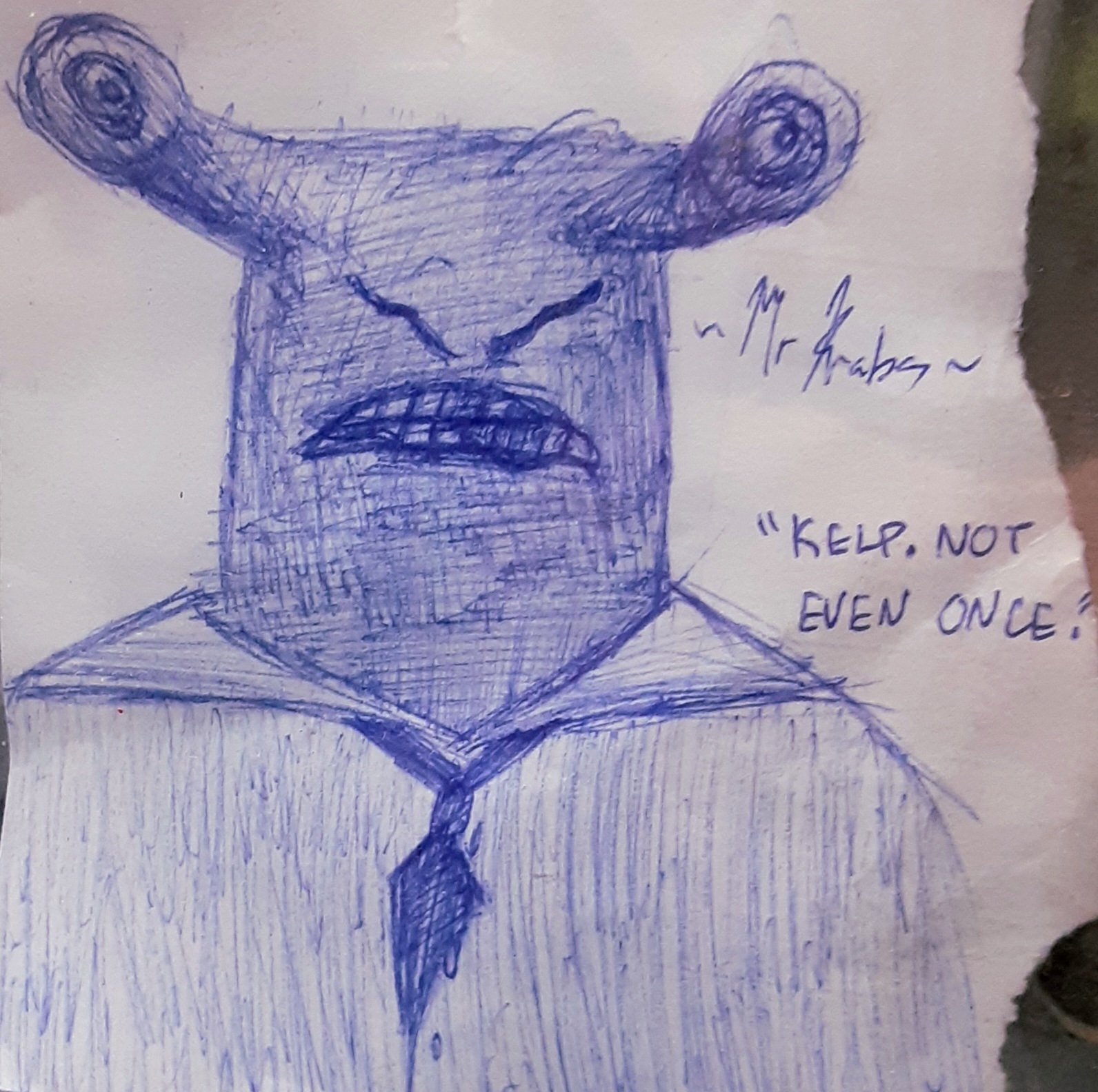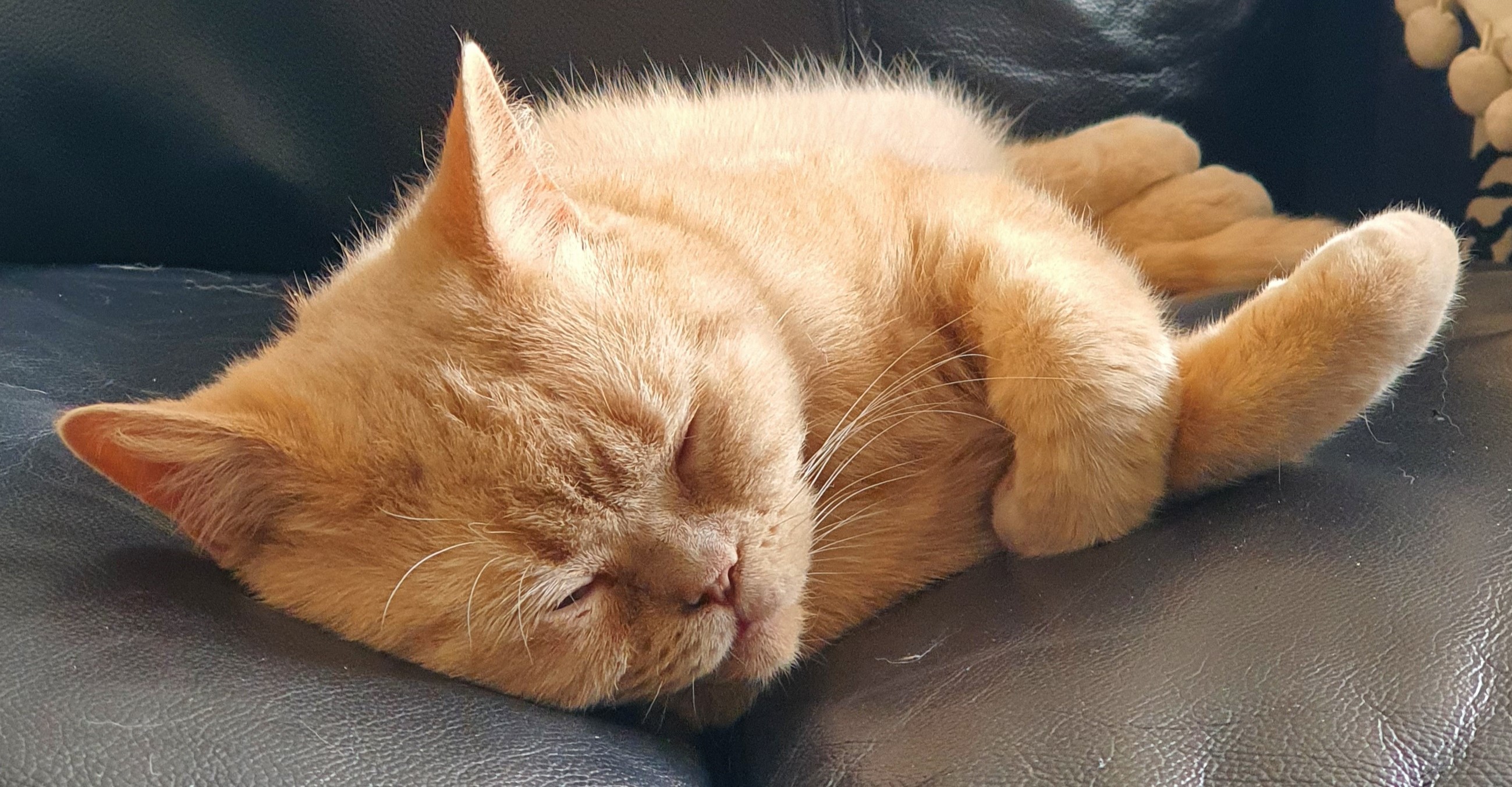In some of the music communities I’m in the content creators are already telling their userbase to go follow them on threads. They’re all talking about some kind of beef between Elon and Mark and the possibility of a boxing match… Mark was right to call the people he’s leaching off of fucking idiots.
I care. I’m just increasingly convinced it’s too fucking late.
I stopped using Facebook 10 years ago, but I’m loathed to actually delete my account because every once in a while, a long lost friend or relative contacts me there. It would be a shame to lose touch with people. Ultimately I care about that more than privacy. It’s the same with Whatsapp. I’ve made a concerted effort to convince my immediate family to try XMPP, Delta Chat and Signal, but they just won’t install another app unless everyone they know is using it. I find it a bit frustrating, but that’s reality. So I have to keep using Whatsapp.
We can always keep a never in 10 years updated profile active for family and stuff. The biggest danger is for active users after all: they’re the most vulnerable to targeted media manipulation.
By being present in their lives (while giving up as few data as possible to big corporations) they can have by their side someone with good advices on privacy, manufactured consent, rights violations and adjacent topics. Alienating ourselves from them isn’t really beneficial in the long run.
I use WhatsApp as well for the people I keep in touch with, and have an active Instagram account where I use only the chat feature. It’s enough to keep up with the people in my life.
For whoever is even more privacy concerned, it’s possible to run those apps in sandboxed mode through some apps.
I use WhatsApp as well for the people I keep in touch with
And everyone in your address book not using WhatsApp should come by once in a while and slap you for selling their numbers for your convenience… You are right… keeping a basically inactive Facebook profile is harmless in comparison.
They all are already on WhatsApp though. All my phone contacts are WhatsApp contacts already (and have been before I added them).
If I need to interact with anyone who desires ultmost privacy I’m not idiot enough to ask for their phone number, and they’d be really out of their mind to share if that’s the case.
But sure, I guess a cousin or smth might want to slap me in the face for “selling” data they already sold themselves years prior.
I live in Germany and everyone here uses WhatsApp. If you decide to uninstall it, you’re cut off from 95% of your friends, family and your coworkers.
It’s not an option to not use it, sadly. From what I understand, it’s like iMessage in the USA. Extreme monopoly and very hard to break out of it.
I live in Germany
Same here… and most of my contact list (and I) dropped WhatsApp when Meta bought them or a year later when the eavesdropping and phoning home to Meta was publically discussed in the media. The remaining minority is able to use another alternative on top of WhatsApp (that’s one of the reason I like to remond them that they provide Meta with data from the people opting out…). That was also nearly a decade ago (2014/2015), so pretending that you need to use WhatsApp in 2023 is indeed a choice.
pretending that you need to use WhatsApp in 2023 is indeed a choice
It’s not as easy as you make it sound. Between 2015 and 2022, Whatsapp’s marketshare has increased a lot in Germany. So it might’ve been comparatively easy to drop it 8 years ago. It’s not anymore.
Maybe I’d be able to convince a lot of my friends to install another app just for me. But it would be hard to do and involve a lot of arguing on my end. I’m not a missionary and I choose to spend my lifetime for other, more important things.
Or maybe you would realize that a lot of people think the same but are also convinced to be alone and unable to change anything… Just like it happened for me back then the moment the first few made the effort to change. We will never know.
deleted by creator
Even if you get them to care once you show them all they need to do to have a shred of privacy they shrug say something along the lines of “well I don’t have anything to hide anyways” and go back to their merry way. The path of least resistance will always win sadly
I’m just curious if you’re a tech worker? (or a teenager interested in tech)
I ask because I feel like people who work in tech are basically exposed to the dangers of web privacy all the time. I remember having to implement a facebook pixel on a website, and realizing the network of surveillance that facebook have spread across the web at that time. So I have pretty decent privacy behaviors, still far from great but maybe slightly above average.
But when I go to the doctor and I mention how often I eat fast food and drink alcohol, or when I go to the dentist and admit I don’t floss everyday - I’m sure those people are thinking ‘most people seriously don’t care about their health’. They might stop short of ‘fucking idiot’, hopefully.
I’d also say that those health issues are much more practically impactful than Instagram showing you ads for luggage when you’ve bought a plane ticket.
Caring about ad tech is a hobby. It’s as good a hobby as any other, but that’s what it is.
Sure I think thats fair. My larger point is that everyone is biased over time by their hobbies and professions, and we should be careful how harshly we judge others by our yardstick.
You can be casual about it, but I don’t think it’s a hobby to seek to understand something that you’re very nearly forced to coexist with. I have to acknowledge there’s ideology behind statements like this, but it’s more analogous to knowing your enemy’s capabilities. It’s a necessary prerequisite to forming an effective defense.
But I’ve come to understand many people don’t share my antagonistic mindset. That’s fine, but they should still understand the interactions they’re having with these systems in even just the vaguest terms, because the effect on their lives is very tangible.
I’m saying the very idea that you need to ever even think about this as a defense against the enemy is the hobby. There’s only a battle to be fought here if you want there to be, and most people don’t want that. The impact on their lives is not actually tangible. Ad tech doesn’t really hurt anyone. No one likes it, and at best, it feels a little gross, but feeling vaguely icky is not the kind of tangible impact that reliably drives people to action. What happens to you when Facebook or Google bundle you into anonymized groups of eyeballs and promise advertisers that they’ll show you ads relevant to the profile they’ve built of you? Nothing really. If you think about the way they built that profile by tracking your every move online, then yes, it feels creepy, but that’s it.
i love a good analogy. point taken.
The Average person, in my experience, doesnt give a shit about their privacy…because they are stuck on the notion of “what do I have to hide? I didnt do anything wrong!”
And all attempts to explain them that you dont have to have anything to hide for your privacy to be important and be protected fall on deaf ears and accusations that you, the one trying to protect them must be some kind of bad/evil/criminal person to be that concerned with privacy.
These people tend to be absolute delights to deal with when their shit gets stolen, and they expect everyone else to fix it for them.
Well okay, with my piracy habit perhaps I do have something to hide😂
But I also think most people don’t realise they do have stuff to hide.
Everything should be private by default. All this shit about nothing to hide is the opposite of that - trying to justify why something should be private. The question is rather why it should be public.
There companies profit enormously on our data and we get exactly nothing in return except the ability to use their service, under the conditions that they put in place. We have zero power to change anything at all about what they provide for us.
A user in that context is similar to a loser. Someone who has no ability to control what happens.
I mean if you want to start paying a fee to use social media… that’s just the choice they make
I keep seeing people saying “I have nothing to hide” is a bad argument. But no one ever explains why it is. So for the people who say they don’t care about the privacy, what would you say to them about why they should care?
Because everyone has stuff to hide. You dont have to have criminal activity, ongoing or in your past, to want to keep your privacy and keep things hidden. I always counter with “Okay, then lets paint your social security number on the side of your car if you have nothing to hide”, and they always stammer and stutter about how thats different and that would cause them no end of headache if someone got it and stole their identity.
And yes, thats the point. You have stuff you want to protect and keep others from knowing. Not just for identity theft reasons, but for social reasons as well… You probably don’t want your spouse to know how much you hate their sibling for no reason, or want your boss to hear what you say about them at home, You dont want people at the bagel shop to know your bank account number and password, Or any of a thousand other things that you do every day, that you dont want other people to know about.
Personally, I’ve always thought “They could sell your data to insurance companies who might jack up your prices or claim something is a pre-existing condition” to be the most p we persuasive to people like my parents.
tbf if you’re not american it’s better
But Facebook/Twitter/etc isn’t telling out boss what we say about them at home. Or our SSN to every car we pass. Or how much we hate it family-in-law.
Unless you give them realistic reasons, they will always counter with “That’s different” because it is.
Some really good arguments. But here’s one from the Cyber Security side. We all know about the CIA, but do you know about the other CIA?
- Confidentiality – Information that you store or transfer is only readable to those you designate.
- Integrity – Information you store or transfer is only alterable by those you designate.
- Availability – Information you store or transfer is available to those you designate when they need access to the data.
Confidentiality is the heart and soul of a functioning life. You do have stuff to hide, even if you say you don’t. Do you want a rando to know your passwords? Do you want your wife to find out about your birthday gift to her before the big day? Do you want your nosy neighbour to start gossiping to the entire neighbourhood about what you and your wife did on her big day? Do you want that big secret plan that will make you the next Mark Zuckerberg be found out by the real Zuckerberg and now he’s rich and you’re not? All of these are things that aren’t illegal, yet are still private information that someone like you might want to make confidential.
And this isn’t even the tip of the iceberg. Sure, you might argue, you shouldn’t be posting your plans for the Zuck-killer on Facebook, but your actual words are not the only thing Facebook stores and analyses. They know a lot about you. What you liked. What you commented on. What you searched for. What you looked at. They know things about you that you never ever said. For instance, even if you never said “I’m a Democrat” in so many words, or even if you don’t share overtly political posts, they still know your ideologies and are willing to sell this information to everyone and sundry. Facebook is even building profiles on people who never created accounts on Facebook. Imagine being Republican and working for a Democrat boss. You’ve worked hard to keep politics out of the workplace, because while there may be anti-discrimination laws if you’re a woman or a minority, having an unpopular political opinion is not protected in as many places, so you could easily lose your job if Facebook discloses to your boss that you’ve not got the right political views.
If Confidentiality really was not an issue and everyone could live open lives without consequence, we’d be talking about the IAs of security, not the CIAs. That we are talking CIAs shows that yes, there actually IS a need for secrecy, and we actually DO have things to hide, even if we don’t moonlight as murderers, cat-burglars, or strippers.
PS: I don’t believe you have never had it explained to you why 'I have nothing to hide" is a bad argument.
PPS: Very strong sea lioning vibes here.
PPPS: Seems like this nonsense started cropping up on Reddit when it became clear the protests were having an effect. And now it’s here. So much dishonest debate tactics being thrown around the whole “we want an alternative to the creepily intrusive policies of main-stream social media” debate. I wonder why? </sarcasm>
OK, ngl that
{democrat|republican}rendering as democrat is pretty cool.
Who knows what will be worth hiding in the future. Something that is nothing to hide today might get you in serious trouble in the future.
I really think this thread is a great example of why the average person doesn’t care that much.
The whole thread is full of comments like “the issues caused by giving away all your data are too abstract, too far away, or too difficult to understand”. This is true by the way, I completely agree.
But I haven’t seen a single comment trying to explain those possible issues in an easily understandable way. The average person (or, at least me) reading threads like this won’t learn anything new. Give me a practical issue that I might face, and if I agree that it’s an issue, I’ll focus more on avoiding that issue.
In other words, an example:
- Let’s say I’m a person using lemmy/mastodon, only using privacy-focused search engines etc.
- If I would now change to using facebook/threads, started using Chrome as my browser, etc the usual mainstream tracking stuff - what problems can this cause for me in the future?
PS. I do agree with the notion of “minimize the data you give away”, which is one reason I’m here, but I really don’t have an answer for these questions. I’m like “I understand the point of privacy, but can’t explain the reasons”.
I’ve always felt like data gathering is kind of like lobbying. It is not directed toward you in person. It is used to shift the way people think and their opinions on topics.
A company / non-profit / movement / whatever lobbying towards a goal might be buying lunches or making seminars and talking about their point with selected group of people who have a say in a topic. Or they might not but they are in the vicinity of the topic or perhaps they are a group that a the company feels like they do not know what the fuck they are talking about and that needs to change.
These are not directed toward you but to a group of people whom you most likely have nothing to do with. This group has power to change something. Whether for good or for bad, that depends who doing the lobbying and for what purpose and how you think about the topic.
Data gathering is similar. This data that is being gathered is not identifiable to you (or it can be but this is not what I am talking about) but it gets clumped together with a buuuuunch of people. This bunch might be people from country x or Christians or people who like Mc Donald’s or who are against gun-rights or pro abortion or people whom think that companies should not be pushing climate change responsibility to the consumer. This clump of people are the same bunch that the lobbyists are targeting. But they do not have direct power over a subject, in general. Point being that even if most of the people have no power over a topic, some of them might (they might hold power oma person company deciding whether to do more against climate change). And even if they do not, they will converse about the topic and this will shift the general consensus around a topic.
And this bunch of people can be very accurately targeted. People in their 20-30s, who graduated (or will soon) from a university that are most likely to go work in high-tech companies in or in the government who have people around them (family, friends) that are against gun-rights but still own guns and do hunting? Ezpz. Or perhaps own a car and drive a lot and have relatives far enough that car is a necessity but have shifted their thinking being more against cars? Np.
The problem is that this does not easily be used against you in particular. But it can be used against a group of people that you are a part of. It is used to shift the way we think as a community. It is used to push ads and news articles (or just the topics of articles because glancing it also works) to you, comments in twitter, posts in Facebook, and change the search results that you might see. Kind of like ads as well; ads work really well even though lots (most?) people would say that ads don’t make them buy a product and only annoy them. Advertisers aren’t dumb, they know exactly what people think and how they function, and ads work.
And again to reiterate, it has nothing to do with you. You are a blip. But you are a part of a larger community and in order to shift that community toward something all of its little bits and pieces need to be moved toward that target. Not all of them need to move toward that target. Just enough.
This got a bit rambly I think but anyhooo it’s kinda how I see it.
So, if I understand correctly, and please correct me if I’m wrong, but the simplified version of this is: data collection allows massive cooperations to target Communities of Interest (CoI) and manipulate them by collectively altering their digital perception via a barrage of targeted advertisements, promoted articles and suggested social media posts?
And all of this leads to an eventual shift in the opinions and desires of said CoIs, leading to what the company would deem desirable behavior, be it growing apathetic to digital privacy, buying their product or growing more engaged with their platform?
This isn’t a plug, but it is a link to an article I wrote for exactly this reason. I tried to succinctly explain why privacy matters with real work examples and precedent.
Great content here, thanks
I remember back when Snowgen first leaked all of that imfo about government tracking. One show, either the daily show or colbert report, did an episode about it. Almost no one they talked to cared until they mentioned the government can also track your dick pics.
Bad actors may use it to manipulate you or cause problems in other aspects of your life (HELLO data breaches!).
This is a hypothetical. Think about all of the normal stuff people could see about you on Facebook. Would you also want those strangers to have your other personal information and possibly passwords? How about your boss? School? Insurance agency? Bank? Someone who works at one of those places, and still remembers that information after they clock out?
Let’s say there isn’t a data breach. They also use that information to try to get you to click ads, even if those ads might be unsafe to click.
Please answer something for me. What is it that makes you think that Zuckerberg would act in your best interests? What would stop him from turning around, selling data again? How can you know that he will keep that data in trustworthy spaces, and away from bad actors?
I wouldn’t even give my own parents access to that level of information unless I absolutely had to. I’m certainly not happier about a stranger having access to it.
deleted by creator
If an algorithm knows exactly who you are, then it knows how you think, and it knows what sort of content will manipulate you politically. And right wing political content is profitable. It’s called the alt right pipeline. Most people have some kind of argument that will manage to radicalise them to any position you can name. Through correlative learning, an algorithm will look at how people like you changed their views, and it’ll send you down the same path. It’s easy.
Cambridge Analytica. Not only did they influence the elections and general political attitude of the Philippines, it also affected US elections as well. I think there was a genocide that was caused by targeted campaigns too, not sure where it happened, though.
don’t forget Facebook knowing that their programs increased teen suicide rated but still stayed course because changing that negative content would lower revenue
Don’t you feel like awareness of it can be the number one thing to protect you from the manipulation that is rampant? I look at everything and say that is trying to change my mind. Unfortunately, with that comes this cynicism that I’m being sold to all the time and whatnot. But if I happen to hop on a browser that doesn’t have AdBlock, I don’t walk away having spent money on snake oil, or I don’t go sign up for my local right wing political action committee, because I’ve been made aware consistently that everything is aimed at getting me to give something.
And let’s be real, we all remember the constant reference to the Reddit hivemind. If we’re saying they’re wasn’t some sort of external influence that landed everyone on the same wavelength, that feels naive. Or I’m a cynic and can’t enjoy anything anymore.
No, awareness isn’t the number 1 protection, it’s the number 3 protection. The number 1 protection is actually having a nuanced understanding of the issues so that when propaganda tries to prey on your misconceptions, it can’t find any. And the number 2 protection is avoiding propaganda, because anything starts to sound persuasive if it’s repeated enough. Awareness is important, but it’s just not as effective as those two other protections. It has too many weaknesses.
I think that’s pretty well put and I’ll agree with it.
In spite of everything telling me not to I still pop over to Reddit because I think there is still value there, even if I have to wade through the bullshit and the bots and whatever. A couple subs weren’t infested with shit yet. But for sure it’s a risk assessment, and I think I got it, but probably I’m not as smart as I think.
The average person doesn’t understand modern technology even on a basic level. Most people don’t know what Free Software is or what end-to-end encryption is and you can’t have privacy without those two. And those things have existed for decades. What about more complicated topics such as cryptocurrencies or AI? It’s easy to see that most people don’t understand them either.
So when it comes to some basic aspects of modern technology, most people are decades behind. Sometimes I even meet software developers who don’t fully understanding those topics.
I even meet software developers who don’t fully understanding those topics.
As an operations side IT, I’ve met a lot of developer side programmers (even really good ones) that don’t understand computers in a functional sense.
That’s kinda sad. I think our education is just not good enough when it comes to IT.
True, it should really be a foundational course now, and not just “here’s Microsoft office” level shit. With more advanced stuff left to collegiate courses.
Both programming in a high level language like python and A+ level CompTIA type thing.
Sometimes I even meet software developers who don’t fully understanding those topics.
“Even” software developers? That’s kind of a weird thing to say. Programming as a discipline is far broader and deeper than most people realize (and that includes software developers!). Knowledge in one limited specialty does not translate automatically into knowledge in a different specialty and, indeed, can actively interfere with another domain without intensive retraining. (For a concrete example of this, just look at the abominations made in "embedded"1 programming by people coming at it from writing Yet Another CRUD-backed Web App.)
So it’s absolutely possible for someone who’s a real whiz with making web app front ends to have a very hazy grasp of security and privacy. It’s a peripherally-related discipline at best.
1 “Scare quotes” used because I don’t view what amounts to a PC running Linux in a funky form factor as meaningfully “embedded”.
I just expect programmers to know more about software. They should know those things at least on a basic level. They should be the ones to educate people about it, because otherwise who will do it?
If software developers don’t understand what end-to-end encryption is, what hope can we have that an average person will understand it? I just don’t know how we can make progress if even technical people don’t know technology well enough.
You missed the part about how large software is.
I could (and probably have worked!) my entire professional life in domains you’ve never once caught a glimpse of using kit you wouldn’t recognize. To me it’s trivially obvious how to, say, debug an SPI bus timing problem where you might not even know what an SPI bus is without looking it up in Wikipedia first.
(I guarantee you that within 3m of you there are orders of magnitude more SPI connections than any form of encrypted connections.)
Now the only reason I know what end-to-end encryption is and why it’s important is because I took a short break in my mainline career and worked on PKI for about six years. (I then ragequit commodity software and went back to actual software engineering, but that’s a different story.) Had I not had that experience I could likely have made some guesses as to what E2EE entailed, but I certainly wouldn’t have understood immediately why this was a critical feature.
Really, software is a FAR LARGER domain than you think. Hell, it’s far larger than I think, probably, and I think it’s ten times larger than you think. 😉
You are right that it’s a huge field, but I’m not saying that we should be familiar with all of it. I’m saying that since we rely on software every day, there are a few concepts that every person should understand on a basic level. That knowledge would help them make better decisions and probably the world would be better if most people had it. Software developers should also understand those few concepts, but perhaps on a bit deeper level than an average person would.
A person can have privacy without knowing what SPI is, but it’s very unlikely for them have it or keep it long term if they don’t know what Free Software is. What you do requires deep knowledge of the hardware, which an average person doesn’t need to have. But they should know what cryptocurrencies and AI are, since those technologies are slowly becoming a part of our lives.
I don’t blame average people or software engineers for not knowing those things. But I think something went wrong in our society if people don’t understand very important concepts that impact our daily lives and which are mostly decades old. This proves that we can’t keep up with modern technology even on a basic level. Don’t you think that’s bad?
I’m saying that since we rely on software every day, there are a few concepts that every person should understand on a basic level.
Loooooooooooooooooooooooooooooooooooooooooooooooooooooooooooooooooooooooooooooooooooooooooooooooooooooooooooooooooooooooooooooooooooong before anything software-related I’d put knowledge of fundamental statistics in the queue for things people deal with on a daily basis that they should understand at a basic level. It’s one of the most critical skills a person can have in modern life and it’s one that almost nobody (including almost all programmers) has any kind of understanding of. If they did have a better understanding of it, to quote the Great Sage Equalling Heaven:
That knowledge would help them make better decisions and probably the world would be better if most people had it.
😉
And that’s just the beginning of the list. I’d also put basic psychology, basic marketing, basic civics even ahead of any degree of software knowledge. Knowing marketing, for example, wouldn’t cause someone to be fooled to the point of saying something like this:
But they should know what cryptocurrencies and AI are, since those technologies are slowly becoming a part of our lives.
But gentle snark aside:
But I think something went wrong in our society if people don’t understand very important concepts that impact our daily lives and which are mostly decades old.
Try tens of thousands of years old. You make it sound like the problem is technology. The problem is the same as it’s always been: people. A better understanding of people, of their motivations, of the tricks they use to further those motivations, etc. is what makes you better able to manage life and society. Understanding the tricks of marketers and advertisers (even before those were words in human language!) is what makes you understand things like “hype cycles” and “if you haven’t paid, you’re not the customer”. You’re focusing on a single channel of abuse. There are MILLIONS of channels of abuse. Learning why people find said channels and how/why they exploit them is a far more valuable skill.
Oh, and statistics. You need that too. You have NO idea just how bad we are at those and just how important that knowledge is for spotting grifters, liars, and other scum.
Yes, there are many things that people should be taught at school. Technology is just one area. All of the things you said are also very important, but it doesn’t make what I said invalid.
Knowing marketing, for example, wouldn’t cause someone to be fooled to the point of saying something like this:
But they should know what cryptocurrencies and AI are, since those technologies are slowly becoming a part of our lives.Fooled by what exactly? A distributed ledger or machine learning? I think it’s a simple fact that those technologies are becoming more popular.
You make it sound like the problem is technology.
The post is about privacy and software. It’s important for people to be educated in other areas as well, but they weren’t the topic of this discussion. So there was no point for me to mention them.
You’re focusing on a single channel of abuse.
I make software, so I talk about software. I’m not an expert in the other areas that you mentioned.
I make software, so I talk about software. I’m not an expert in the other areas that you mentioned.
You’re so close, and yet so far, from grasping the point with this pair of sentences.
I think most people realize they’re too boring for anyone with access to individual info to care who they are. Do you really care to know what porn I look at or what I’m buying online at 3am on a week night?
Nobody cares what porn you are into. Probably.
However, women using period trackers were free to do so in the US up into recently. Now that data can be subpoenaed and used to help prosecute if it is believed she may have had an abortion.
You never know when information posted online, or collected otherwise, could be used against you. It’s best to seek privacy respecting options whenever possible.
True, in that it’s a balance of risk versus reward. But there’s a middle ground between putting your SSN on a billboard and faking your death to go off the grid and burn off your fingerprints. I’m willing to bet 99.9% of people aren’t worried about it because they’ll never have to be.
What if I told you that you can increase your privacy a lot without having to fake your own death? You don’t even have to burn off your fingerprints! All you have to do is use alternatives to certain popular apps. Isn’t that great?
Just use Signal or Matrix instead of WhatsApp. Use Firefox instead of Chrome. At some point you could even replace Windows with GNU/Linux (an operating system that doesn’t spy on you! crazy right?). Some of those are tiny sacrifices, some are bigger, but none of them are impossible.
I get it. But I am experiencing absolutely zero drawbacks to any privacy concerns, so any potential sacrifice is almost completely unnecessary. I’ll support some similar things because I consider them good causes, but I have no problem being an open book. To bring everything back full circle, I assume most of the population feels similarly, and that explains why most people don’t care (which was what I was originally replying to).
So you see no problem in living in a world where everything is recorded. That’s crazy.
If the only people with access to it don’t even know who I am, it’s pretty inconsequential, especially since I’m often not doing things online or with a phone or computer. Everything isn’t being recorded.
People who want to deliver you ads so that you may buy their product, thus helping their business, care
Yeah, but that’s my point. How is that gonna negatively effect me in any way?
They can try to influence your political opinions (manipulate you) by showing you certain type of content based on your current beliefs. They will show you content that is more likely to make you addicted to the platform. For some people that’s gonna be dangerous conspiracy theories or scams like alternative medicine.
Maybe you are immune to all of that, but many people clearly aren’t.
Kind of providing insight as to why most people don’t have any privacy concerns. I doubt most people consider that or think they’re so easily swayed. Heck, most people are practically apolitical.
Many people think they are not easily swayed, but in reality most people don’t have any training in critical thinking and often don’t know how to verify if something is fake. Things like confirmation bias make it pretty hard.
They probably don’t know what actually involves giving away their data and what actually concretely means. I’m a tech guy, developer, here in the Fediverse and neither I do know actually what it means. It’s the lack of information the problem. I could imagine it though, but it’s not the same thing. I could imagine that with my data big corps become more powerful, creating more addicting ads, contents and algorithms that eventually will fuck up the world even more. And that’s a nightmare, I know. Metaphorically it’s like intensive farming. “I eat meat because I love it and I can’t give up on it” and as soon as no one sees what actually happens to the animals inside those farmings, no one cares.
They are my mother, father, and everyone else. Life’s hard, and too many things compete for our attention.
You’re right. Indiscriminate data collection is like the meat industry. Some people may find abhorrent how animals are treated, even how destructive the whole thing can be. But ultimately, out of sight is out of mind, right?
Like you said, the same with privacy. Apps are shiny, addictive, and seem to be given away for free. Then life happens, the mind becomes busy with what holds its attention.
We’re doomed because the game being played is simply too complex for anyone make sense of it. Any competing insight is immediately drowned under the massive torrent of data we’re all subjected to.
One problem is that it’s very hard to quantify how much our privacy, our data, is worth. There’s money to be made with it, but we, average people, have no idea how any of that works. This leads to general indifference.
Another problem I see is that most people don’t correlate their continuously worse online experience with being spied. Every facebook change led to lots complaints, but people didn’t quit, they just ate shit until they stopped complaining. Same with Twitter, Insta, Google, Youtube. Since the enshittification happens gradually, they fail to correlate one thing with another.
First of all most people, not just the average person, simply do not grasp what privacy is exactly - especially in the US, where the view on privacy is skewed by its obsolete constitution.
I mean, just the fact that anyone would think if you personally don’t mind sharing personal affairs or being public, then privacy isn’t much of a concern proves the lack of understanding of that principle. It’s like saying, I’m not religious so neither the lack of freedom of religion or the separation of church and state would have any impact on me.
The most important function of the human right to privacy is not the thwarting of interference with one’s property or dignity, it’s the maintenance of the control and power an individual has over their own self - and by extension that of a people.
A simple example: If I give you my phone number, I give away some control over myself because you now have to power to use that property however it fits you. That may mean to just keep in touch with me, to save the number in your contact list that is accessible to ChatGPT, Tiktok or some malware on your phone, or share it with someone who wants to dig up some dirt on me.
The key point is not whether any of the possibilities affect or matter to you but whether you would have any say in how that information is obtained, handled, kept, etc. The effect of the resulting consequences may appear only gradually and sometimes take years but those in control ultimately shape politics, the economy, culture, society. This is also one of the reasons why the US is run by so many monopolies and oligopolies in their respective market segments.
Excellent post!
.de and undertones of capitalism critique? hello mein freund
That wasn’t the intention, however. I was referring to matters of power as seen from the perspective of human rights - without any heed to the structure of any nation’s economy.
It’s like music streaming. The streaming quality is worse and wireless earbuds don’t sound great, but the convenience of it all made that industry huge.
Convenience over quality.
I mean I use galaxy buds at work installing flooring and I love it, but at home I listen to vinyl or the very least flacc with good headphones… but I guess im not the average person in this situation
Have a huge vynl collection, family doesn’t understand why I can’t just stream my music. They’ll never know the sweet sound of vynl.
I mean, I blame Apple and the general trend of aggressively bland minimalism for the wireless earbud thing. You’re not wrong though.
I resisted wireless earbuds forever (had the lightning -> 3.5mm adapter for quite a while) and I’ll never go back to wired earbuds on my phone. The ability to set my phone down while I’m doing a task with headphones in is a godsend for my ADHD.
The wire didn’t add sound quality for 99% of people who were using default Apple headphones or some $10 junk from Walmart anyways.
Everyone has to chose what’s right for them. The reality is Facebook having and selling that data will never impact the average person. But not be part of the family because you are not on Facebook is a real thing that will affect people.
This isn’t choosing what’s right for you. This is having no standards. Most of our society is like this when it comes to software for no good reason. Think how much better the world could be if people cared.
people have different value systems and different standards. no 1 thing is right if it’s based on preference.
Terminally online take.
Boy oh boy, tell me about how society would be better if people cared more about software
You can start by learning about Free Software: https://youtu.be/Ag1AKIl_2GM. You might not have heard of it, since it has only been around for over 30 years.
Here is an alternative Piped link(s): https://piped.video/Ag1AKIl_2GM
Piped is a privacy-respecting open-source alternative frontend to YouTube.
I’m open-source, check me out at GitHub.
Thanks. A license is missing in your repository, but I’m sure you will add it eventually.
Forgot about that, just added one! Cheers :)
Cool, thanks! :)
I’ll go a step more general. People can’t be inconvenienced. Climate change,politics,etc…
If it slightly inconveniences people you’ll need a good leader to push it
Veganism is the perfect example
Nah, many of us non-vegans don’t see animals as having a right to life. I know I don’t.
All many people care about is bread and circuses. Unless their sustenance and distractions are taken away they are complacent.
People join massive protest all around the world for these things. They are willing to spend a day walking around and yelling even if it is an inconvenience.
It is lack of organizing and having a trust that if we just vote for right politician it will be solved. For decades of elections, nothing changed.
We need to organize ourselves as the people, like they do in some countries. Stop the traffic, organize in shifts to stay on road blocking all gas powered trucks. You need to stop businesses from operating normally to give the system some reason to change, instead of just ignoring us and promising us that next election it will be better.
Same for soical media, do the internet equivalent of blockades, DDOS them like anonymous did. They can’t arrest us all. And organize to block police cars when they try to make an example of the few.
you’re right, the average person doesn’t care about their privacy.
and not only do they not care about their privacy, they resent being called stupid for not caring about their privacy. “you’re an idiot” seems to be most privacy advocates go-to argument as to why we should all care more about privacy, and it’s really not making a very good case.
ikr? some years ago, a classmate laughed at me for not wanting to give my credit card to Google to watch a YouTube video with age restriction.
he called me “conspiranoic”, “hysterical” and stuff, and i was just like “why do i have to give my credit card to watch a freaking video?”.
he was the typical “i don’t have anything to hide” guy. he said “it’s not a big deal, they already have lots of info about us, why do you care at this point lol”.
and i am ashamed i got influenced by them and days after, when that restriction appeared again for other videos i searched myself, i ended giving my credit card number.
and he was like making fun of it, like “see? i was right and you did it”.
damn, he was so annoying.
(sorry for this, pal. it was just to say that people gladly share their data to mega corporations, and press us to do the same by calling us conspiranoic).
ikr? some years ago, a classmate laughed at me for not wanting to give my credit card to Google to watch a YouTube video with age restriction.Wait YouTube age restriction need credit card info to unlock?
That, or a photo of your ID, or some other “proof”. Depends on country too probably.
Honestly I don’t think there’s any relevant data google would gain from that that they don’t already have unless you’re very meticulous about not letting them have any, so I didn’t really care.
And you can almost certainly blame “think of the children” type of legislation for that more than google trying to collect more data. Which is also what causes the country variation, it might not be needed at all in some places.
Interesting, from where i from i just need to have google account and hit continue
in my country, i was asked for my ID card, credit card or maybe (i don’t remember this one) driver’s license.
i think it was the algorhythm those weeks randomly flagging videos as age-restricted, or my account as suspicious or something.
Here in Germany I had to upload my ID card
I imagine how the check folks is related to local legislation.
I’m not sure that they ever did.
The turning point for me when I really got a concrete realisation about people absolutely not giving a shit about this was when Snowden came out and I saw the majority of people just go “Eh, that’s pretty fucked, whatever”, and then immediately jump straight back into scrolling facebook all day long.
I realised then that there probably wasn’t any point expecting anything from them. I don’t have much sympathy left for people in this regard anymore.
Most people legitimately don’t give a shit about this issue. I think that they really should, but they absolutely don’t for the most part.
I tried to explain this to my daughter in law when she suggested my wife just use the same password for everything, including online banking.
Ended up in a big row about how she doesn’t give a shit because she has nothing to hide.
Didn’t talk to me for a week.
Thinking about that, perhaps I should rack it up as a success 😏
Can’t disagree with anything you just said



























